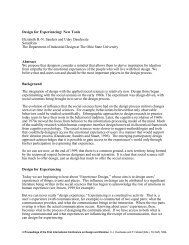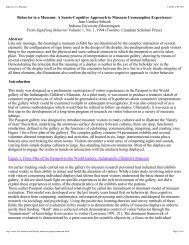: Interface as Content The Construction of Experience - ec(h)o
: Interface as Content The Construction of Experience - ec(h)o
: Interface as Content The Construction of Experience - ec(h)o
You also want an ePaper? Increase the reach of your titles
YUMPU automatically turns print PDFs into web optimized ePapers that Google loves.
David Rokeby : Transforming Mirrors3/11/03 4:21 PMTHE POWER OF RANDOMNESS<strong>The</strong> cl<strong>as</strong>sic story <strong>of</strong> the power <strong>of</strong> randomness is the story <strong>of</strong> the many monkeys at typewriterstyping away for many years. <strong>The</strong> Laws <strong>of</strong> Probability suggest that one <strong>of</strong> these monkeys will atsome point accidentally type the entire works <strong>of</strong> William Shakespeare. And if you accept evolution,then you could say that this h<strong>as</strong> already occurred. Many sub-atomic particles working over a longbut not infinite amount <strong>of</strong> time have managed to generate the works <strong>of</strong> William Shakespeare, bygathering quite arbitrarily into mol<strong>ec</strong>ules, proteins, life-forms, social structures and ultimately intoShakespeare himself.On the other hand, neither a fractal nor a pseudo-random number generator is capable <strong>of</strong> thisfeat. Those systems are “closed.” No matter how far you expand them, Shakespeare’s work will notbe generated. Shakespeare is actually beside the point here. Replace the work <strong>of</strong> Shakespeare inthe above discussion with any extremely unlikely but theoretically possible occurrence (the origin<strong>of</strong> life, the birth <strong>of</strong> the first consciousness or meeting the love <strong>of</strong> your life). <strong>The</strong>se occurrences arestatistically unlikely, but they can have a pr<strong>of</strong>ound eff<strong>ec</strong>t on the life <strong>of</strong> those who run into them.When you think back over your life, which were the really pivotal events: the predictable ones orthe ones that seemed the most improbable?In designing environments for experience, we must remain humble in the face <strong>of</strong> the power <strong>of</strong>irresolvable, non-fractal complexity. <strong>The</strong> computer is an almost pure vacuum, devoid <strong>of</strong>unpredictability. Computer bugs, while annoying, are never actually unpredictable unless this“vacuum” fails, <strong>as</strong> when the hardware itself overheats or is otherwise physically damaged. Thisvacuum is extremely useful, but it’s no place to live.When I started working with interactive systems I saw the “vacuum” <strong>of</strong> the computer <strong>as</strong> thebiggest challenge. I developed “Very Nervous System” <strong>as</strong> an attempt to draw <strong>as</strong> much <strong>of</strong> theuniverse’s complexity into the computer <strong>as</strong> possible. <strong>The</strong> result is not very useful in the cl<strong>as</strong>sicalsense, but it creates the possibility <strong>of</strong> experiences which in themselves are useful and thoughtprovoking,particularly by making dir<strong>ec</strong>tly tangible that what is lost in over-simplification.CONCLUSIONOne <strong>of</strong> the initial motivations behind interactive interfaces w<strong>as</strong> that they would allow users toapply their accumulated common sense and knowledge <strong>of</strong> the world to their navigation <strong>of</strong> theabstract realm <strong>of</strong> information. Abstract things b<strong>ec</strong>ome sensual and experiential. <strong>The</strong> use <strong>of</strong> familiarmetaphors to approximate simulations <strong>of</strong> the real world enables users to make d<strong>ec</strong>isions andhandle data in familiar, intuitive ways. This h<strong>as</strong> been the re<strong>as</strong>on for the dramatic success <strong>of</strong> thegraphical user interface. In retrosp<strong>ec</strong>t, however, this may have been merely a transitional strategy.Children now spend enough time interacting through synthetic interfaces that their common senseand knowledge <strong>of</strong> the “world” will have been formed partly by the interfaces and abstractsimulations themselves. <strong>The</strong> shifting <strong>of</strong> the experiential b<strong>as</strong>e from “reality” to the video game’s oreducational s<strong>of</strong>tware’s virtual reality h<strong>as</strong> far reaching implications. Interaction is not a novelty totoday’s children; it’s an integral part <strong>of</strong> the only reality they have known.From a purely practical point <strong>of</strong> view this is a useful situation. (Imagine a touch <strong>of</strong> sarc<strong>as</strong>m here)Children are adapting from birth to the language <strong>of</strong> synthetic interfaces. We will no longer have toworry about the real-world behaviours and exp<strong>ec</strong>tations <strong>of</strong> our users that make designing intuitiveinterfaces so difficult. Common virtual sense will be widespread.http://www.interlog.com/~drokeby/experience.htmlPage 14 <strong>of</strong> 15





